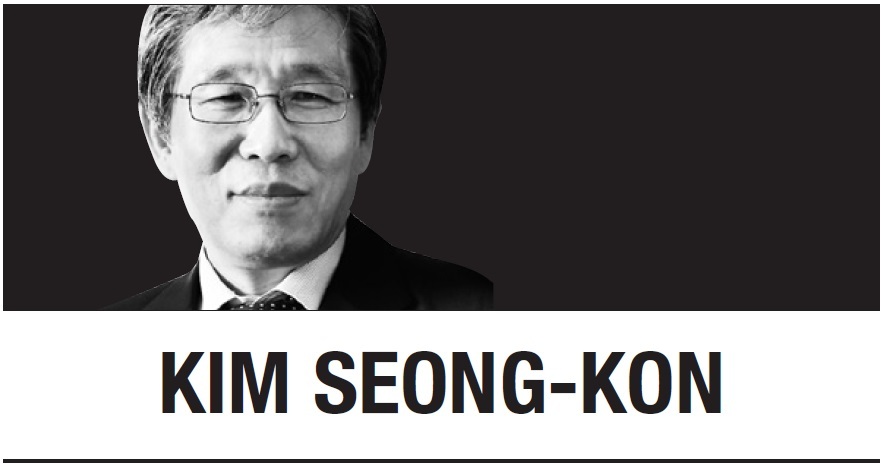
We are now living in the era of globalism when the whole world has become a global village. The boundaries between nations are rapidly collapsing and people are experiencing crossovers everywhere. Take the EU, for example. Practically the whole continent of Europe has become a global village already and Europeans are freely crossing borders without an entry visa, using the same currency and their mobile phone with no extra charge.
Why, then, are we witnessing such sudden unprecedented change in the name of globalization? There is a plethora of reasons. For example, widespread information on the internet, easy international travels, expansion of multinational enterprises and boundary crossing, among others. Thanks to those changes, people can now enjoy shared values, cultures and goods across boundaries every day. The popularity of K-pop, too, owes a lot to such a remarkable recent phenomenon.
In the era of globalism, therefore, ultra-nationalism is no longer valid. If politicians try to instigate ultra-nationalism for political gain, therefore, they are not only ignorant of recent changes, but also misleading the people. Those politicians are like drivers who drive the bus in the wrong direction in a one-way street, putting passengers’ lives in jeopardy. People should refuse such an obsolete nationalist campaign because ultra-nationalism not only puts the nation in harm’s way, but also isolates the people from the international community.
By the same token, if our ideology-oriented, dogmatic teachers and professors try to brainwash their students with ultra-nationalism, they, too, are ruining the future of their country. Teachers and professors should educate and train their students to become global citizens, not ultra-nationalists, especially in this rapidly globalizing world. Otherwise, our young men and women will end up being parochial jingoists, while young people in other countries will spread their wings and soar into the sky.
Unfortunately, instead of encouraging their students to make friends with foreigners and learn from other cultures, some of our teachers and professors wrongfully teach that Westerners are imperialists and foreign cultures a threat to our indigenous culture. They also teach that our culture is superior to other cultures. They do not know that when it comes to culture, there is no superiority or inferiority; there are differences only.
Recently, someone who had travelled to Spain and seen the incredibly exquisite Spanish architecture, confessed to me: “At school, I learned that our Dabotap and Seokgatap were the most gorgeous and elegant historic monuments in the world. But after seeing Spanish cathedrals and mosques, I’ve realized that it’s not true.” Another Korean who had made a tour of Beijing, also told me, “I didn’t know Gyeongbok-gung palace was so small until I saw the Forbidden City in Beijing.” Of course, we should be proud of our country, but we should also know and acknowledge that we are not the only nation that has an admirable cultural heritage.
There is another thing we should realize in this era of globalism. Equality does not necessarily mean equality in individual intelligence, abilities, or wealth. Rather, it means equality in human rights and integrity. Hence, everybody is equal before God and the law. That is common sense in many advanced countries and that is what makes a truly egalitarian society.
In Korean society, however, equality is almost always misunderstood as equality in personal abilities, social class, or distribution of wealth. Perhaps that is why our administrators are now trying to shut down prestigious private prep schools forcibly, arguing that those privileged schools for outstanding students discourage those who cannot enter such schools. The problem is that such a myopic policy will seriously hamper the fostering of able, brilliant students that we urgently need in the era of globalization. Instead, Korea will be full of mediocre people. Besides, those administrators are violating human rights and individual freedom in the name of equality.
Such an ill-advised policy reminds us of Kurt Vonnegut, Jr.’s “Harrison Bergeron.” This futuristic dystopian short story sarcastically begins, “The year was 2081, and everybody was finally equal. They weren’t only equal before God and the law. They were equal every which way. Nobody was smarter than anybody else. Nobody was better looking than anybody else. Nobody was stronger or quicker than anybody else.” Then the story adds, “Somethings about living still weren’t quite right.”
In the story, smart people are required to wear a mental handicap radio in their ears, through which they receive electric shocks from the government every twenty seconds so that they would not be smarter than others. Good-looking people are required to wear a mask to hide their beauty because everybody should be equal. Dancers must wear a ball and chain in their legs because their graceful agility is not fair for those who cannot dance well. In “Harrison Bergeron,” Vonnegut parodies a society like Korea where people mistakenly believe that everybody should be equal, despite individual differences and diversity.
Chanting ultra-nationalism in the era of globalism is awkward and wrong. We should try to meet global standards, instead of provincial Korean standards.
Kim Seong-kon
Kim Seong-kon is a professor emeritus of English at Seoul National University and a visiting professor at the University of California, Irvine. -- Ed.





![[Exclusive] Hyundai Mobis eyes closer ties with BYD](http://res.heraldm.com/phpwas/restmb_idxmake.php?idx=644&simg=/content/image/2024/11/25/20241125050044_0.jpg)

![[Herald Review] 'Gangnam B-Side' combines social realism with masterful suspense, performance](http://res.heraldm.com/phpwas/restmb_idxmake.php?idx=644&simg=/content/image/2024/11/25/20241125050072_0.jpg)
